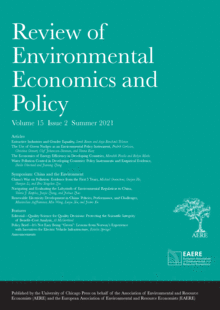Article, Refereed Journal
Review of Environmental Economics and Policy

Severe ambient water pollution is common in many developing countries. A broad array of regulatory and other policy approaches can improve water quality, but some approaches are more well-studied than others, and there are many additional challenges specific to the developing country setting. This paper describes a set of prescriptive, market-based, voluntary and other policy instruments to control water plllution and reviews empirical assessments of these approaches in practice, focusing primarily on developing countries. We also examine additional challenges such as data availability, monitoring and enforcement, rent-seeking, and the issue of decentralization. The paper highlights important gaps in published empirical research on these issues, which increase in importance as the evidence accumulates regarding water pollution's impacts on outcomes such as health, human capital, and productivity.
Research Topic
Natural Resources and Conservation

